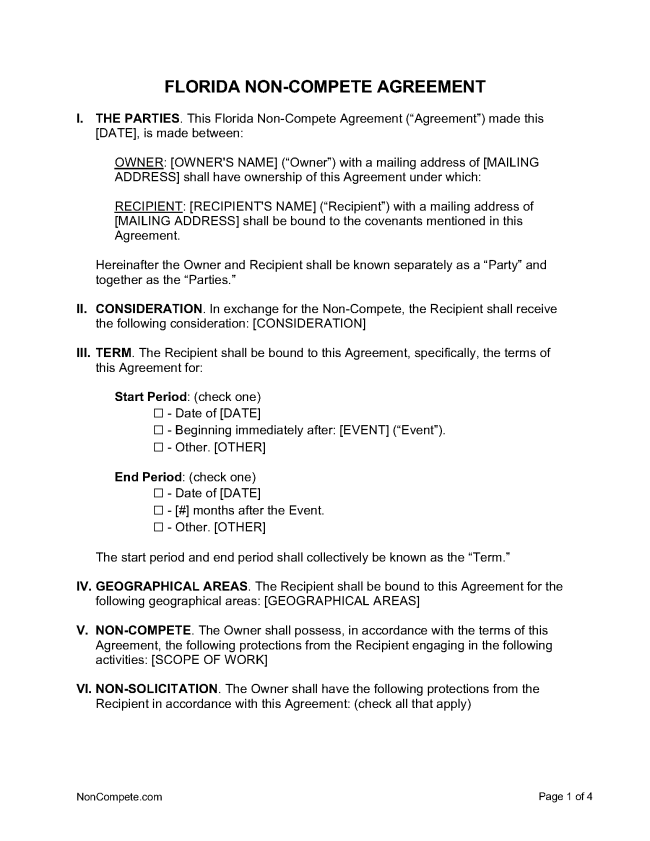A Florida non-compete agreement is a contractual term that limits an employee, partner, or business entity from working in a particular field, geographic area, or specific time. Florida law is much more generous about enforcing non-compete agreements than other states: non-compete agreements that meet the requirements discussed below are presumed enforceable. The state also has much clearer standards for enforcing non-competes than most states.
Table of Contents |
Are Non-Competes Enforceable in Florida?
Yes, non-compete agreements are generally enforceable so long as they are written down, and are reasonable in terms of duration, the area covered, and the type of business involved. Fla. Stat. Ann. § 542.335(1).
Unlike many states, Florida courts are not required to scrutinize non-compete agreements more closely than other types of contracts. Fla. Stat. Ann. § 542.335(1)(h).
Legitimate Business Interest
The party seeking to enforce a non-compete agreement must demonstrate that the agreement will protect at least one legitimate business interest. For purposes of the law of non-competes, legitimate business interests include:
- Trade secrets
- Business or professional information that does not meet the legal definition of trade secrets but is nonetheless valuable and confidential
- Substantial relationships with patients, customers, or clients
- A court is more likely to find a “substantial relationship” when there is ongoing business, exclusivity, a customer that competitors cannot easily identify, and an expectation that the relationship will continue. (Idmworks LLC v. Pophaly (2016)).
- Customer, patient, or client goodwill associated with:
- An ongoing business with an identifiable name or trademark,
- A specific location, or
- A specific marketing or trade area.
- Special training.
Fla. Stat. Ann. § 542.335(1)(b)
Defenses Against Enforcement
Courts will not consider hardship for the person opposing enforcement in evaluating a non-compete agreement. Fla. Stat. Ann. § 542.335(1)(g)(1).
However, courts may consider that the party seeking enforcement of the agreement is no longer operating in the area covered by the agreement or is no longer in the same line of business, so long as this change was not caused by the other party violating the agreement. Fla. Stat. Ann. § 542.335(1)(g)(2).
And courts must consider the effect of enforcing the covenant on the public. Fla. Stat. Ann. § 542.335(1)(g)(4).
Public Policy
A court may decline to enforce an otherwise valid non-compete agreement because the agreement violates public policy. Still, to do so, the public policy requirements must substantially outweigh the need to protect the legitimate business interest. Fla. Stat. Ann. § 542.335(1)(i).
A non-compete agreement whose sole purpose is to prevent competition is always void as against public policy. (White v. Mederi Caretenders Visiting Services of Southeast Florida (2017)).
Prohibited Professions
Attorneys cannot sign employment contracts and partnership agreements that restrict the attorney’s right to practice, except for agreements regarding retirement benefits. Severance agreements between an attorney and a firm that contain reasonable and fair compensation provisions are enforceable, but punitive severance agreements are not. Rule 4-5.6(a), Rules Regulating the Florida Bar.
Attorneys cannot join case settlement agreements that limit the attorney’s right to practice. Rule 4-5.6(b), Rules Regulating the Florida Bar.
Terminating an Employee
In Gold Coast Media, Inc. v. Meltzer (1999), the District Court of Appeals upheld a non-compete agreement that, by its terms, would apply upon the employee’s “termination from employment or engagement by the company for any reason, or for no reason.”
However, it is not clear if a non-compete agreement that does contain a such a provision would be enforceable against an employee who had been terminated.
Burden of Proof
The person trying to enforce a non-compete agreement has the burden of showing that the agreement is reasonably necessary to protect a legitimate business interest. If enough evidence of this is provided, the person opposing enforcement has the burden of showing that the agreement lasts for too long, covers too broad an area, or is, in fact not reasonably necessary to protect the business interest. Fla. Stat. Ann. § 542.335(1)(c).
Continued Employment (consideration)
Continued employment is typically sufficient consideration to enforce a non-compete agreement. (Open Magnetic Imaging, Inc. v. Nieves-Garcia (2002)).
Maximum Term
For non-compete agreements that do not involve trade secrets:
- For agreements with former employees, courts presume that agreements covering less than six months are reasonable and that agreements covering more than two years are unreasonable. Fla. Stat. Ann. § 542.335(1)(d)(1).
- For agreements with former franchisees, dealers, or distributors, courts presume that agreements covering less than one year are reasonable and that agreements covering more than three years are unreasonable.
- Fla. Stat. Ann. § 542.335(1)(d)(2).
- For agreements involving the seller of a business interest or professional practice, courts presume that agreements covering less than three years are reasonable and that agreements covering more than seven years are unreasonable. Fla. Stat. Ann. § 542.335(1)(d)(3).
For non-compete agreements that do involve trade secrets, courts presume that agreements covering less than five years are reasonable and that agreements covering more than 10 (ten) years are unreasonable.
Blue Penciling (allowed)
Suppose a non-compete agreement covers an excessively long time, too large a geographic territory, or is not reasonably necessary to protect a legitimate business interest. In that case, a court shall modify the agreement to make it enforceable. Fla. Stat. Ann. § 542.335(1)(c).
If an agreement is not presumptively invalid under the Florida statutes mentioned above, courts must have a separate, specific reason to modify it. (Southernmost v. Torregrosa (2005)).
